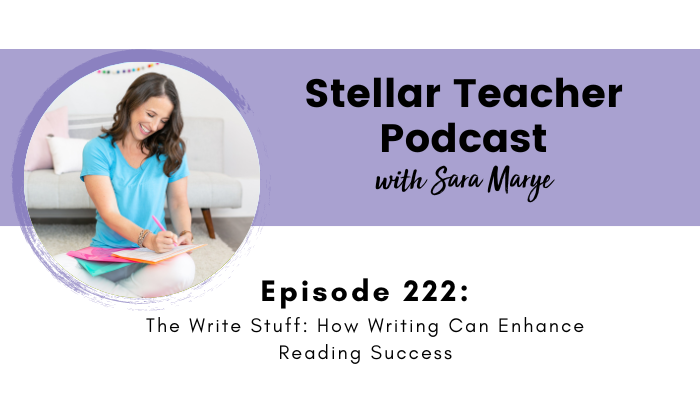
Click play below to listen to ways to get your students to “write stuff” about reading, and ideas of how to incorporate it into your literacy block.
In this episode, we’re exploring the benefits of writing about reading. Research shows that engaging students in writing about what they read can significantly improve their understanding and retention of the material. We’ll unpack what this research means for your classroom, why it’s particularly impactful for struggling readers and writers, and how you can make “writing stuff” a regular part of your literacy block.
So why is writing about reading so powerful? It not only helps students clarify their thoughts and focus on the most important information from a text, but also encourages them to make connections and reflect on their reading. The process of transforming their ideas into their own words, whether by summarizing, sharing personal opinions, or writing reviews, pushes students to think critically and engage actively with the content. Throughout this episode, we’ll explore how you can incorporate these writing activities into your teaching practice, making it a seamless and effective way to boost student comprehension.
Ready to get started? We’ll be sharing three simple and practical strategies for bringing more writing about reading into your literacy block. You’ll learn how to help students summarize texts, respond with personal reactions, and write reviews—all of which can be done with minimal prep work. By the end of this episode, you’ll have a range of ideas to implement immediately, so you can begin to see the benefits of this powerful practice in your classroom today. Tune in, take notes, and think about which of these writing tasks you can introduce to your students this week!
In this episode on getting your students to “write stuff” about reading, I share:
- Research on how writing about reading is beneficial to students.
- Engaging ideas and prompts on incorporating writing about reading into your lessons.
- A variety of ways and times to incoporate writing about reading into your literacy block.
- The importance of getting your students to “write stuff” in reaction to their readings frequently.
- That it’s critical your students receive instruction on how to write stuff.
Resources:
- Join The Stellar Literacy Collective
- Sign up for my Private Podcast: Confident Writer Systems Series
- Sign up for my FREE Revision Made Easy email series
- If you’re enjoying this podcast, please leave a review on Apple Podcasts!
Related Episodes:
- Episode 103, 5 Tips That Help Students Improve in the Area of Writing About Reading
- Episode 105, How to Incorporate Writing About Reading During Small Groups
- Episode 155, Get INSPIRED To Teach Writing This Year!
Connect with me:
- Join my newsletter
- Shop my TPT store here
- Instagram: @thestellarteachercompany
- Facebook: The Stellar Teacher Company
More About Stellar Teacher Podcast:
Welcome to the Stellar Teacher Podcast! We believe teaching literacy is a skill. It takes a lot of time, practice, and effort to be good at it. This podcast will show you how to level up your literacy instruction and make a massive impact on your students, all while having a little fun!
Your host, Sara Marye, is a literacy specialist passionate about helping elementary teachers around the world pass on their love of reading to their students. She has over a decade of experience working as a classroom teacher and school administrator. Sara has made it her mission to create high-quality, no-fluff resources and lesson ideas that are both meaningful and engaging for young readers.
Each week, Sara and her guests will share their knowledge, tips, and tricks so that you can feel confident in your ability to transform your students into life-long readers.
Tune in on your favorite podcast platform: Apple, Google, Amazon, Spotify, Castbox, and more! If you’re loving this podcast, please rate, review, and follow!
Podcast (stellar-teacher-podcast): Play in new window | Download
You’re listening to episode number 222 of the Stellar Teacher Podcast.
Hey there, stellar teacher! Welcome back to the podcast. Today we are going to be talking about ideas for writing about reading. Now, I think it was two years ago I did an entire series all about helping students improve in the area of writing about reading. If you are a newer listener, you might want to go back and check out some of those episodes. They start with episode number 103 so go back give that series a listen if you want to learn more about writing about reading. And I did that entire series because getting students to write about their reading is incredibly effective when it comes to helping students improve their comprehension, and it benefits students in a lot of ways. And since I haven’t talked about it in a while, I was like, Okay, let me do an episode about writing about reading. Because of course, I have more things to say about it than when I first did that series back in 2022 so today I’m going to share three different ideas for how you can incorporate more writing about reading in your classroom.
But I also want to take some time before I get to the practical stuff to really help you understand how valuable this activity is, and if it’s not something that you’re already doing in your classroom on a regular daily basis. Hopefully it’s something that you decide to spend more time doing. So writing about reading, like I said, is an incredibly beneficial task, and it is something that we should incorporate into our literacy blocks, really, as often as possible. And the reason why comes back to some educational research in 2011 Steve Graham and Michael Hebert used a meta analysis to find the effect of writing on reading. And when I first started reading educational research and journals and things like that, I saw this term meta analysis and was like, what does that even mean? So if you’re wondering what a meta analysis is, a meta analysis is just a statistical method that combines the results of multiple studies to draw a single conclusion, so the results are not based off of just one type of research. It looks at multiple different studies and experiments and comes up with a single conclusion.
And through their meta analysis, they found that 94% of the studies that they looked at indicated a positive effect on whether or not writing about reading enhanced reading comprehension, and that effect was very statistically significant. And they also found that writing about reading had an especially positive impact on the comprehension of weaker readers and writers. And again, they explained that 83% of the studies and experiments they reviewed indicated a positive effect.
So just looking at the numbers alone can really help us feel confident that when we spend time getting our students to write about their reading, it is going to have a positive impact on their comprehension, whether they are a strong or struggling reader. And I think the reason why writing about reading can be so beneficial is for a lot of reasons.
First of all, when students write about their reading, it is going to help them create clarity. If you think about it, writers are going to have to choose the most important information from the text, so they’re going to have to get really clear on what is important from what they read.
Writing about reading also encourages students to make connections. They’re going to have to organize their ideas into a coherent sentence, paragraph, whatever they’re writing. They’re going to have to figure out the relationships that happened in the text and how they’re going to communicate those in their writing.
It also prompts for reflection, really depending on the prompt. But even if it is just answering a question from the text, writing about reading is going to encourage students to think about the question, and think about their response. But then, okay, let me go back. Let me read my response. Let me reexamine. Let me think about the details. Let me think about my understanding and how I’m going to communicate that. So it really encourages students to reflect on their reading and their writing.
But I think a huge benefit is that writing about reading really promotes active involvement in learning, which is always something that we are trying to get for our students. Writers have to actively decide what they want to include in their response and how they want to approach the content that they are creating. So it is a very active activity, and it requires a lot of deep critical thinking.
And it also requires students to have a change of rewording, or if you think about it, this is often referred to as a transformation. They can’t just copy ideas from the text, especially if you use some of the writing about reading ideas that I’m going to share in this episode. But students can’t just take a section of the text and copy it. They have to rephrase the ideas in their own word, which is going to ultimately deepen their understanding of the text.
So all of those benefits come from this one literacy task. And so hopefully you’re getting a sense of how valuable writing about reading assignments can be for your students. And hopefully you’re thinking, Okay, I want to do more writing about reading for my students. But what exactly does that look like? And I think this is one of those things that we hear this general category and term writing about reading, and we’re like, is that more involved than I think it is? It sounds pretty straightforward, but what do I actually need to do?
And the good news is, is that it is as simple as it sounds. We want to get our students to write about what they read, but of course, we want to do it in a productive way. So there are tons of ways that you can provide structure to a writing about reading assignment. And I’m just going to share three ways with a lot of different variations that you can incorporate writing about reading into your literacy block. And my challenge to you is, as you’re listening, I want you to think about which task you can get started with today or this week. Because this is something that you don’t have to do a ton of planning or prep work for. Pick one of these activities I’m going to share, try it today, see how it goes, and then refine it as needed.
So the first general category of writing about reading that you can have your students do is to summarize the text. So we’re simply writing a summary. And what I want you to think about is that summaries can be very formal. They can be a paragraph. They can have a lot of structure. But they don’t necessarily always have to be formal. There are really simple ways that you can get students to summarize that will have them thinking about the main ideas in the text, but will provide just a very quick response. And again, according to a different study done by Hebert, Simpson, and Graham, processing what you remember about a text and writing it down in a summary can improve comprehension even more than just answering questions. So again, this is something that we want to regularly have our students do when they are reading.
And so things that you can do strategies or ways that you can get your students to summarize. You could give them a simple prompt to summarize what you read using 10 words or less. So they’re really writing a single sentence to summarize what they read, but we’re giving them some parameters. You could teach your students a strategy like the somebody, wanted, but, so, then (SWBST) and you could have your students write down the individual word. Who’s the somebody? What is it that they wanted? But what happened? And as they write down the word, then they could take those details and turn it into a sentence or two that summarizes the text. But you could even have a summary prompt be as simple as asking your students, what do you think was the most important idea from the text, and then have them share it in one or two sentences. It doesn’t need to be formal. It doesn’t need to be this long thing. It doesn’t need to be complicated. You could even ask your students to jot down notes as they’re reading a chapter, and then ask them to share one sentence at the end that would explain to a friend the most important thing that happened in the chapter. Like I said, summarizing doesn’t always have to be a formal paragraph. There is a lot of benefit to getting your students to think about, what did I read, what are the most important details, and can I put that in my own writing? So that’s the first way that you can get your students to write about reading.
Another way to do more writing about reading is to ask students to write a personal opinion or their reaction to the text, and writing a reaction or an opinion is exactly what it sounds like. Ultimately, it’s going to give students a chance to share their personal thoughts about a text. And I did this a lot when I was in the classroom, and I loved it, because it was an opportunity to let students voice their opinion about a text, and it also can be a sneaky way to give purpose for reading to students who maybe don’t like a specific genre or topic. You know, I had some students in my class that didn’t enjoy nonfiction, or they didn’t enjoy fiction, and if they knew what we were reading, they had a sort of a tendency to want to check out. But let’s say you’re reading a text about playing soccer, and you have a student who just really does not like sports and does not like soccer. You can keep them engaged in the reading by reminding them, okay, at the end of the story, you’re gonna write a personal reaction and keep a list of all the things that you don’t like about this text, so that way you can include it in your reaction. So we’re giving them a purpose. You can really encourage students to be very opinionated and include a lot of voice in their writing when they’re sharing their personal opinion. So it can be a fun way for students to be really strong in their writing and their reaction to the text.
So again, we want to think about giving students some either guidance or parameters for this. So an easy way that you can assign your students to write a personal reaction or an opinion is to give them a couple options of prompts and then let them select which one they want to write about. And I like this option because it also is giving students choice. Anytime we can bring more choice into our instructional day, it just helps create buy in. So to do this, you could give students two to three questions that would spark a personal reaction or opinion about the text, and then have them pick one to respond to. So a couple of questions you could consider giving to your students would be, did you enjoy this text? Why or why not? What would you have changed about the text if you were the author? What do you agree or disagree with? What seems important to the author or characters, and is it also important to you? So anything that is really getting them to just share their personal opinions or connections about the text. Again, give them a couple different questions, say, pick one of these to respond to. The responses don’t need to be short. One to three sentences can be sufficient to give them that practice.
So the third idea to get your students to write more about reading is to have students write a review of the text. And again, similar to the personal opinion, but a little bit more structured or formal. It’s a little bit different than having students answer a question or summarize. And so again, the idea is teaching students, okay, we’re going to give a review, which is kind of like your advertisement for the text, or your support of the text, or if you are like against reading it, you want to create your review that is going to discourage others from reading the text if you didn’t particularly like it.
Again, you can give your students different prompts and have them write a review. So some examples could be, how many stars would you give this book and why? Who would you recommend this book to? Why would they like it? Who should not read this book? Why? Would you read this book again? Explain. Giving your students the assignment of writing a review for a book can be a really fun activity to bring into independent reading. Because those are books that you know you’re typically not sharing as a class, but then you can have your students share their reviews in your classroom library. So that way, when students are going to the library, they can see reviews of other books that students in their class have read. And then another added benefit, that I’ve talked about in the past that anytime we’re giving our students a writing assignment, if we can bring a real purpose to it, it’s going to make it more meaningful. So if students know that this review is going to be posted in the library and other students are going to read it and use it to make decisions on what books they’re going to select, they might put more time energy and attention into it. So again, writing a review is another way that you can get students to write more about reading.
When we think about these three activities: summarizing the text, sharing a personal reaction or opinion, and then writing a review, we can incorporate these into all parts of our literacy block.Teachers are often like, okay, is writing about reading considered writing? Is it reading? When do we do this? Is this like a whole group activity, a small group of activity, and the answer is, it’s all of them. You can fit it in in different ways. And I think one of the things that can make a literacy block really fun is when there is opportunity for variety, and writing about reading is one of those opportunities.
So you could, on occasion, include writing about reading as part of your students, independent reading. So if part of your literacy block is dedicated to having students read independently. Maybe you give them whether they’re reading chapter books or picture books or articles, whatever they’re reading. Maybe you give them some parameters – that after every book, or so many days, or just at some point – rather than just reading, we’re going to have them write about what they read. You can prompt students to summarize what they read, write a review of what they read any of the examples I shared. But independent reading is a great opportunity to let students write about their reading.
But you can also do writing about reading after your whole group lessons. So if you read a picture book out loud, or even a chapter in class as part of your novel, or if you’ve read a science article, you can have your students write about their reading. So this might look different depending on the amount of time that you have. So maybe you read the text and then immediately after reading on the same day, you have your students write about their reading. But if you don’t have a ton of time in your literacy block, you feel like you’re crunched for time, then maybe this is something that you read a book on one day, you come back to it the next day, and then the reading activity for that second day is to have your students revisit the text and write about the idea or topics that were included in the text in some sort of way. So writing about reading can be part of your whole group lessons. And I definitely think when you’re introducing these to your students spending time modeling and teaching them how to effectively write about reading is going to be very beneficial.
You can also incorporate writing about reading into your small group lessons. So in the same way that you can write about reading as part of your whole group lessons, you can also make it part of your small group schedule. And I think that incorporating writing about reading into your small group lessons can be particularly powerful because it’s an opportunity for you to give immediate feedback to all of the students as they are writing. You can see exactly what everybody’s writing. You can give them feedback on their syntax, their sentence structure, their grammar, their ideas, the details they’re including, and it’s a great opportunity to make it much more of a teaching experience, as opposed to just a practice experience.
And then, of course, you can also make writing about reading a Literacy Center. So if you have workstations, one of your Literacy Center workstations could be a writing about reading task or prompt that you regularly swap out, and students could either connect back to a text you’ve read as a whole group or as an independent reading. So many options.
So as you can see, there are so many different ways you can write about reading. There are so many different ways you can incorporate it into your literacy block. The important thing is, is that we just get started with it.
Now, one final thing I will mention, and again, this came from the study by Steve Graham and Michael Hebert, but one of the things that they mentioned is that the effects of writing and writing instruction on reading are likely to be minimized if students write infrequently, or they receive little instruction in how to write. And so I think it’s important to know that writing about reading is going to be beneficial to your students, but only if it’s something that we do regularly, and we’re regularly giving students an opportunity to write about their reading, and we are also regularly teaching them how to actually write. So writing about reading is not a replacement for our writing instruction. It’s something that we want to add, in addition to our reading and our discussions and the graphic organizers and what we’re doing during our reading block to just give students an opportunity to boost their comprehension.
So again, just to quickly recap the three really super simple ways that you can bring in more writing about reading to your instruction are: you can have students summarize the text, you can ask them to write a personal opinion or reaction to the text, and you can have them write a review of the text. And what I want you to do right now is think about which one you’re going to implement today, and then just get started with it. Sometimes we tend to overthink things and feel like we have to plan and prepare more than we need to. So my challenge to you is to have your kids write about reading today, and then, of course, based on how it goes, make whatever adjustments are needed. But get started.
I hope you have a stellar week, and I will see you back here next Monday.

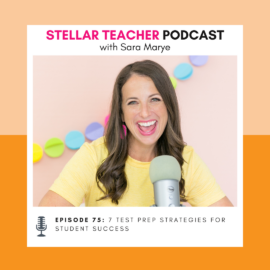
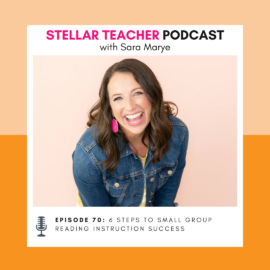
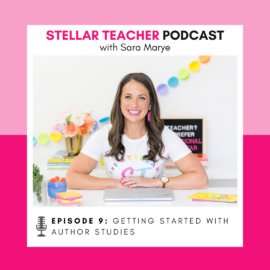
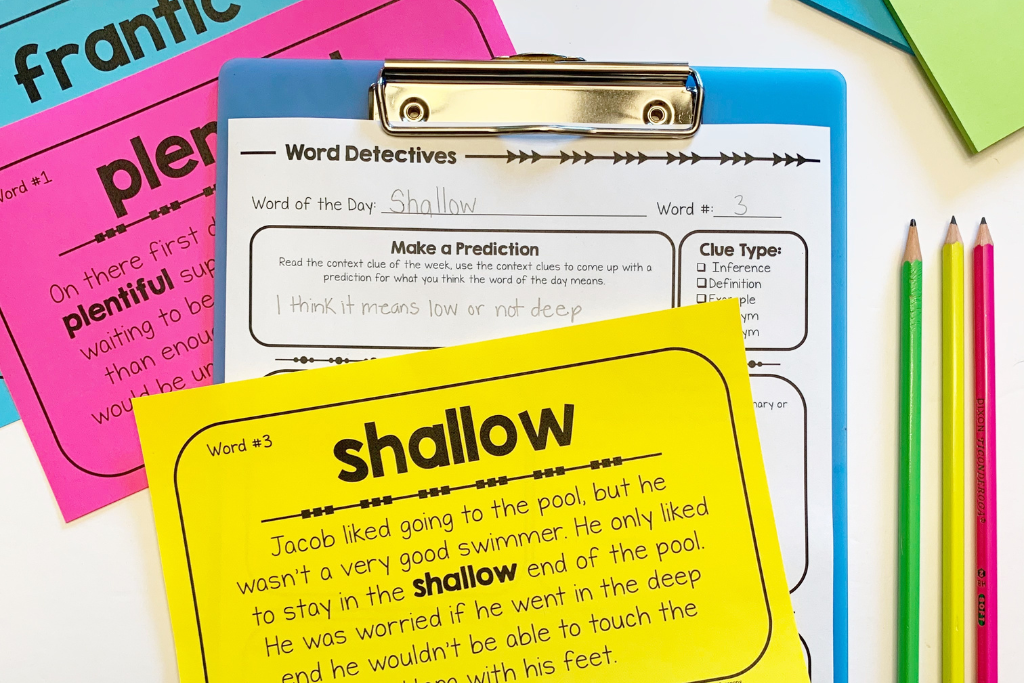

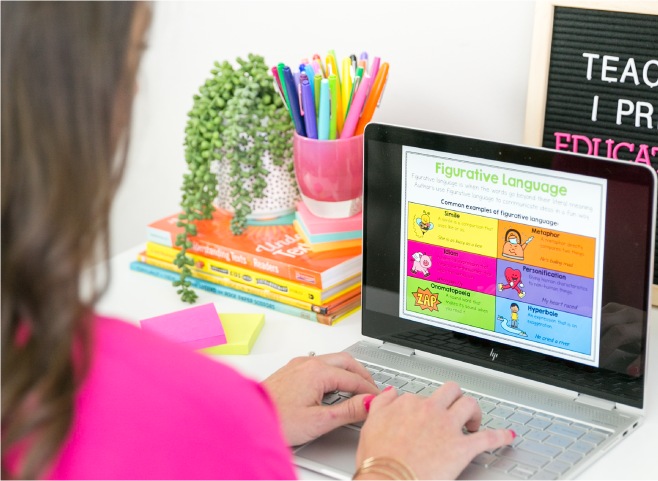
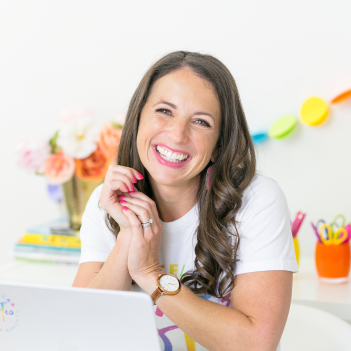
Leave a Comment
You must be logged in to post a comment.